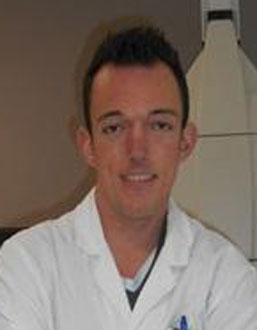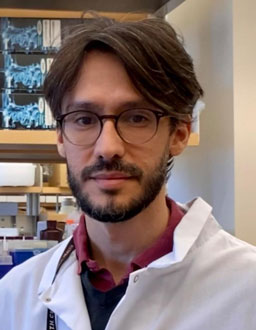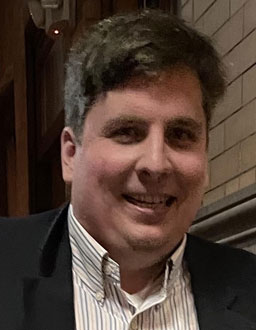 |
Elicia Estrella, MS, LCGC
Elicia has been a member of the Kunkel research lab for over 15 years. She is a board certified and licensed genetic counselor. She has a MS in Genetic Counseling from Brandeis University and an MS in Neuroscience from Boston College. Elicia oversees patient enrollment, coordination of genomic sequencing, reporting of research results. She also participates in Boston Children’s Hospital’s neuromuscular clinical team and in the new DMD multidisciplinary clinic counseling patients with neuromuscular disease and helping them get a diagnosis and enrolled in available research programs.
|
 |
Jeffrey Widrick, PhD
Jeff joined the Kunkel Lab in 2013 after completing an undergraduate degree from State University of New York at Cortland, a master’s degree from the University of Massachusetts at Amherst, and a doctorate in Exercise Physiology at the Human Performance Laboratory at Ball State University. Jeff did post-doctoral training in muscle physiology in the Department of Biology at Marquette University with support from a NASA Postdoctoral Research Fellowship. His early work also consisted of studying the detrimental effect of non-weight bearing actions on muscle function paired with the development of the exercise-based interventions. Within the Kunkel Lab, Jeff’s interest is focused on understanding how dystrophies and myopathies impact muscle contractility, looking at how contractile function can be improved or restored by novel therapeutic interventions. Jeff approaches his work across several levels of biological organization, from small zebrafish larvae to human muscle biopsies. By providing a physiological prospective with focus on muscle strength and performance, Jeff is able to translate functional assays that are typically performed on rodent muscles to the Kunkel lab zebrafish model. |
 |
Matthias Lambert, PhD
Matthias joined the lab in the February of 2017 after receiving his Ph.D. in physiology from Lille University in France. His doctorate research was completed under the supervision of physiologist, Pr. Bruno Bastide and proteomics professor, Dr. Caroline Cieniewski-Bernard. While completing his Ph.D., Matthias focused on the characterization of the role of a post-translational modification, O-GlcNAcylation, in the sarcomere structure of the skeletal muscle and it’s involvement in muscle diseases. Using the C2C12 myotubes model, Matthias determined that O-GlcNAcylation is a fine modulator of the sarcomeric morphology, it is involved in interactions between key structural proteins such as desmin and alpha B-crystallin, and O-GlcNAcylation has O-GlcNAc binding sites on various proteins of interest. In the Kunkel lab, Matthias plans to first use a library of novel small molecules (which modulate different signaling pathways in the zebrafish sapje screening model) to modulate Jagged1 protein and restore dystrophic phenotype as seen in previous animal models. His second goal is to move these efficient molecules into a preclinical mouse model and create and new transgenic mouse line expressing Jagged1 in an inducible way. In his spare time, Matthias enjoys playing the drums while discovering new food and culture from all over the world. He is also an active member of the French Muscular Dystrophy Association. Matthias is from Saint-Omer, France. |
 |
Felipe de Souza Leite, PhD
Felipe joined Kunkel’s lab in February of 2020 to continue a collaboration with Zatz’s lab in Brazil. Felipe is a research fellow leading a study that seeks a novel therapy for muscular dystrophies. His primary expertise is skeletal muscle physiology. His research background includes techniques designed to investigate the muscle cellular and sub-cellular contractile properties, cell culture, tissue engineering, methods in stem cell biology, and microscopy. Felipe obtained his Ph.D. at McGill University, where he performed force measurements using skinned myofibers, single myofibrils, sarcomeres, and purified myofilaments from rabbit psoas. After that, Felipe joined the Genome and Stem Cell Research Center in São Paulo to work with bioengineering of skeletal muscle tissues from Duchenne patients’ induced pluripotent stem cells (iPSC). Felipe's current work uses zebrafish for drug screening and iPSC-derived skeletal muscles to model muscle dystrophy. You can find a list of Felipe’s publications here. |
 |
James Conner
Research Technician
Jamie joined the lab in August of 2017. He has a B.S. in chemical engineering from the University of Amherst and has always been interested in molecular biology and genetics. He is responsible for day to day operations in the lab. This includes maintenance of both zebrafish and genetic models of disease as well as safety and animal protocols. His main interests in the lab are working with data from both simple experiments to more complex differential gene expression from next gen sequence data. He has worked on increasing the turn around on analysis of muscle tissue samples by implementing a semi automatic measurement software Myosight and building an R pipeline to quickly visualize data. |